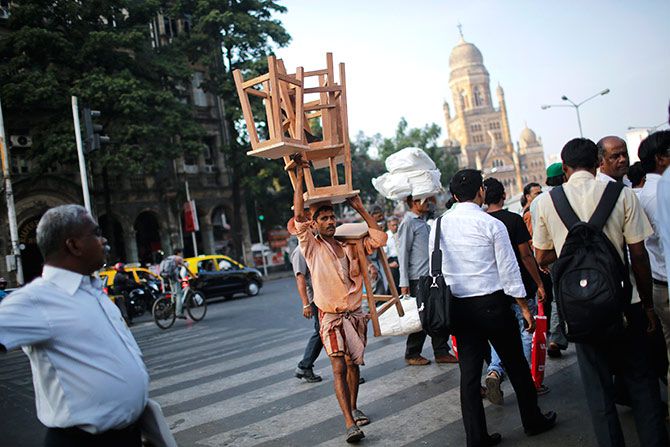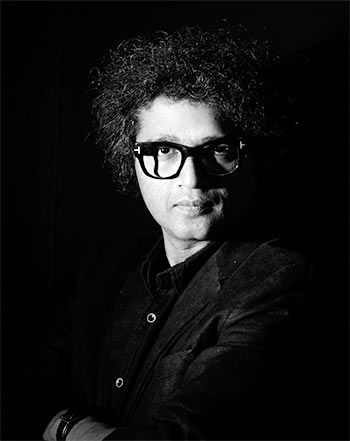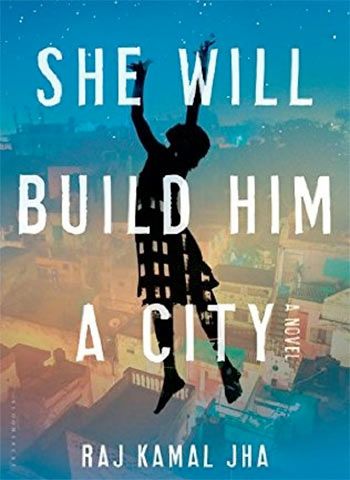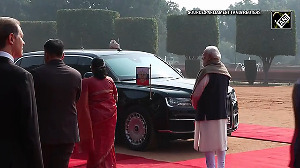
'In the newsroom, the thought process is about understanding the story, it's about complicating the story, constantly guarding against the black and white, trying to look beyond the obvious.'
'As for the fiction-writing process, it's similar in many ways, but more internal. The people and the places where one needs to go are all inside you.'
Raj Kamal Jha is an unusual journalist.
As Chief Editor of The Indian Express newspaper, he holds a job that must take up all his waking time. Yet, in the last 15 years, he has written four novels, each one a complex interplay of human behaviour which, you know, cannot be dashed off in a month's time.
Quiz him about his inspiration, finding time from his hectic work life to do the involved writing that is required to write these books, Jha, a creature of the night, shrugs it off saying the newsroom -- for the uninitiated, imagine a huge, real-life Twitter stream -- is where he gets his ideas from.
His writing style is reminiscent of an unconventional artisan playing with words; he uses them the way a software engineer would use code to build the product of his dream. If Jha, a qualified engineer who came into journalism many years ago, were a techie, his art would draw approval from no less than Steve Jobs, such is the quality of writing he displays.
Never is an extra word used, never is a scenario stretched beyond its point -- skills, one suspects, Jha honed on the shop floor of the newsroom.
Despite leading the editorial team in India's finest newspaper, one cannot recall seeing Jha's photograph in it. Yet, ironically, the only time Jha comes out of his intensely private, secure silo is when his book is out, when he is forced to grant interviews, appear at literature festivals and do all the things associated with a book launch.
"The novel forces me to step out a bit. Then, it's back to the day job," he tells Saisuresh Sivaswamy/Rediff.com in an e-mail interview about his latest book, She Will Build Him A City.
What was the spark that set you on She Will Build Him A City?
Not a spark exactly, more like a constant flicker.
Watching change that was both exhilarating and disturbing, imagining what's it like when the flat world begins to tilt, when things and people begin to slide off its surface. Where do they fall into? That was one persistent question.
The other was the view from the newsroom, where you find more and more stories about hope and aspiration along with those of anger and impatience.
Can you talk about your writing process? In the sense, you hold an important job which must take up all your time. So how do you manage to churn out four books in, what, 15 years? You must be a very disciplined man to be able to juggle work, family, some me-time plus write a book.
That I have written only four novels in 15 years shows I'm not exactly great at juggling with time. But I am not complaining.
I am privileged that these 15 years, in fact, 19, I have been at The Indian Express, a newspaper where we have some of the finest reporters and editors. You can't get a better climate for storytelling than this.
Just being in the Express newsroom, working with reporters and their stories, is a significant part of my writing, thinking process.
While reading your first book, The Blue Bedspread, and now reading your fourth, I have been fascinated by your thought process. Can you take me into your mind and tell me how you write?
I don't think I know my mind as well I should.
In the newsroom, the thought process is about understanding the story, it's about complicating the story, constantly guarding against the black and white, trying to look beyond the obvious. Is there someone we should have spoken to and we haven't, is there a place where we should have gone to where we haven't?
As for the fiction-writing process, it's similar in many ways but more internal, the people and the places where one needs to go are all inside you.
How exactly does the writing flow for you?
I scribble, pen and paper. I love stationery, ruled pages, blank pages, notebooks, black pens... I use these a lot.
I like the look of words written down on paper, the white space.
I write a lot in longhand, I also leave some work for elves who may come in at night and sometimes they don't come and then you get those clunky sentences.
 Reading you, I've also wondered is 'mad' the normal in your world? I find there's evil, no, let's make it a very frightening 'not normal', lurking below the surface in your book.
Reading you, I've also wondered is 'mad' the normal in your world? I find there's evil, no, let's make it a very frightening 'not normal', lurking below the surface in your book.
Do you also believe there's a darkness in us that is waiting to break free and sometimes doesn't even need a spark?
I doubt if it's as dramatic as that... that there's this darkness inside us that's waiting to break free.
Louise Erdrich says it very well in her beautiful book, The Round House. Everyone has a monster inside, she says, most of us keep it locked up.
I think most of us don't even know where the keys are, so we let the monster sulk, brood, even play inside. (Left, above: The author. Photograph: Neeraj Priyadarshi).
How do you conjure up characters, situations? Like, the scene with the dog tied to firecrackers shook me so badly (please read excerpt below), I couldn't return to your book for a couple of days after that. I thought I'd need therapy for visualising it. How do you come up with stuff like this?
That scene, I don't know where it came from, it did disturb me too. That's why by the end, the dog had to grow wings and fly into the moon and stars.
For a journalist like you who, I know, fiercely guards his privacy, it must be wrenching to pour yourself out into a book. How do you overcome your need for privacy with this, if I may use the word, exhibitionism? I've even seen photographs of you floating about in connection with the book... will wonders ever cease!
I am most comfortable living in the wonderful space, preferably dark, lit by a table lamp, behind the bylines and stories of the Express reporters. They are the ones whose work does and should do the talking.
The novel forces me to step out a bit, but the good thing is that the exhibitionism, as you call it, the posing for photographs, etc, etc, is for a few days plus and minus date of publication.
Then it's back to the day job that, fortunately, goes on well into the night.
Read on for an excerpt from Jha's She Will Build Him A City (Alert! Not for the faint-hearted)
 Diwali evening, there is a terror alert across the city: security agencies suspect an attack by the Lashkar-e-Toiba, a spectacular hit, say the men and women on TV, bigger than the 26/11 Mumbai attacks, this time they may come by air, breach the no-fly zone, glide down from the sky in parachutes filled with poison gas.
Diwali evening, there is a terror alert across the city: security agencies suspect an attack by the Lashkar-e-Toiba, a spectacular hit, say the men and women on TV, bigger than the 26/11 Mumbai attacks, this time they may come by air, breach the no-fly zone, glide down from the sky in parachutes filled with poison gas.
The alarming word has spread, he sees policemen at every street corner, they prop themselves against lamp-posts. In dirty brown uniforms, they look like straggly plants in clay flowerpots.
He wants to walk up to them, tear their limbs, pluck their leaves.
One by one.
~
He, Sukrit, Arsh and Aatish. Four friends and one dog, too. Black-and-white. The dog is a bitch, teats swollen but pups missing.
Brave Dog.
Homeless in this city, day and night, Dog hears trucks thunder by, she hears the cough of the sick and the old, she breathes exhaust, in and out.
But that evening, the Diwali fireworks reduce her to a scaredy-cat, make her stray into Apartment Complex where fountains and sparklers whistling from earth to sky, hissing rattlesnakes on fire, twinkling lights strung across balconies force her to squeeze herself flat under a blue Porsche Cayenne (Rs 1.2 crore) in Visitors' Parking.
Right next to a sprawling concrete quadrangle fringed by five apartment towers that glow in the night sky, towering lamps of glass and steel.
(They love this game, putting the price of everything they see in brackets.)
He stands and watches as, crouching on all fours, craning their necks to see under this car, Aatish and Sukrit dangle one Kentucky Fried Chicken leg each (Rs 119 for half a bucket). Part chewed, mustard-ketchup-mayo smeared like ointment on an open wound.
Dog is frightened but she is hungry, too.
She trusts the four, so she crawls out, even lets Sukrit clamp her jaws with both his hands, lets Arsh grip both her front legs, lets Aatish lift her tail, tie four rockets (Rs 245 for a packet of six) to it with a plastic string.
Dog lunges for the chicken leg which has fallen to the ground now but Arsh kicks it away, Aatish pulls her tail hard, she pulls, she pushes, she strains against hands and fingers that hold her down, she tries to wriggle out but with her jaws forcibly shut she can only twitch, muffle her bark.
In one deft flick, Aatish lights the four rocket wicks with his cigarette lighter. The first sparks sputter, they let Dog go, they watch.
Flames leap, saffron, green and white, a bit of blue, colours of the flag.
Dog makes a sound.
~
It is a sound he has never heard before.
It comes from Dog all right but it is more than just sound, it has a shape and texture too, hard edges that scrape his skin like a knife. He smells flesh burn.
Dog runs but she can go only a few yards before she trips.
One by one, each of the four rockets rips the plastic string, embeds into Dog's back, a jet of fire that gouges a hole in her black fur, mats its fringe with charred skin and blood.
Three clear holes, the fourth one bleeds into them.
Dog crumples like a balloon, its gas draining out.
~
My turn, says Sukrit.
He opens Dog's mouth, parts her jaws, she offers no resistance, he lights a chocolate bomb and drops it inside. This is how they do it in Iraq, Sukrit says, they do this to people, with real bombs, I watched it in a documentary.
Arsh flicks his cellphone (Rs 41,245), records the explosion, its aftermath. Seventeen seconds.
Bitch, Arsh says.
Like the dogs in Amores Perros, Sukrit says.
They like movies, they run backwards, Dog pieces raining on all four.
Excerpted from She Will Build Him A City by Raj Kamal Jha, Rs 599, with the permission of the publishers, Bloomsbury India.
Image published for representational purposes only.
Photograph: Danish Siddiqui/Reuters










